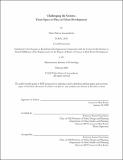Challenging the generic : from space to place in urban development
Author(s)
Limansubroto, Valeri Patricia(Valeri Patti)
Download1200231871-MIT.pdf (94.39Mb)
Other Contributors
Massachusetts Institute of Technology. Center for Real Estate. Program in Real Estate Development.
Advisor
Dennis Frenchman.
Terms of use
Metadata
Show full item recordAbstract
On its current trajectory, is most new development destined to be torn down and completely remade? Have all the 'greats' already been built? At the risk of sounding melodramatic, I'd like to think not. How can we steer development down the right path - the path of timeless relevance and meaning? The case for historic preservation and adaptive reuse has largely been proven. If the 'bones' of a place are thoughtfully assembled, the place will be loved and utilized well into the future. Even as a city's needs progress, society will always find a way to retain the places worth saving (similar to our present treatment of storied sites). My thesis explores the multifarious notion of 'place' - specifically, what determines people's connection to place. Is it possible to create an authentic and uncontrived identity (a 'sense of place') within large scale, contemporary development, especially when there is little to no historical context to draw upon? Through this investigation, I intend to generate an applicable framework for ground-up development that fosters lasting value for the developer, investors and community at large. 'Building well' today has repercussions beyond the usual laundry list of place-making benefits. Contrary to popular belief, it is much more environmentally sustainable and economically viable to invest in the careful creation of one building, rather than the cyclic demolition and replacement of poorly conceived, cheaply constructed buildings. As demonstrated by the case studies and interviews, it is also capable of realizing outsized financial returns - though it can be challenging to assign a definitive dollar value on this. At the very least, I hope this cross-disciplinary study acts as a starting point, introducing esoteric concepts to audiences actually responsible for its implementation. When we venture beyond the limitations of superficial place-making, we can create places that are not only perceived as desirable today, but that also possess the tacit complexity and richness to stand the test of time.
Description
This electronic version was submitted by the student author. The certified thesis is available in the Institute Archives and Special Collections. Thesis: S.M. in Real Estate Development, Massachusetts Institute of Technology, Program in Real Estate Development in conjunction with the Center for Real Estate, 2020 Cataloged from student-submitted PDF of thesis. Page 141 blank. Includes bibliographical references (pages 126-133).
Date issued
2020Department
Massachusetts Institute of Technology. Center for Real EstatePublisher
Massachusetts Institute of Technology
Keywords
Center for Real Estate. Program in Real Estate Development.